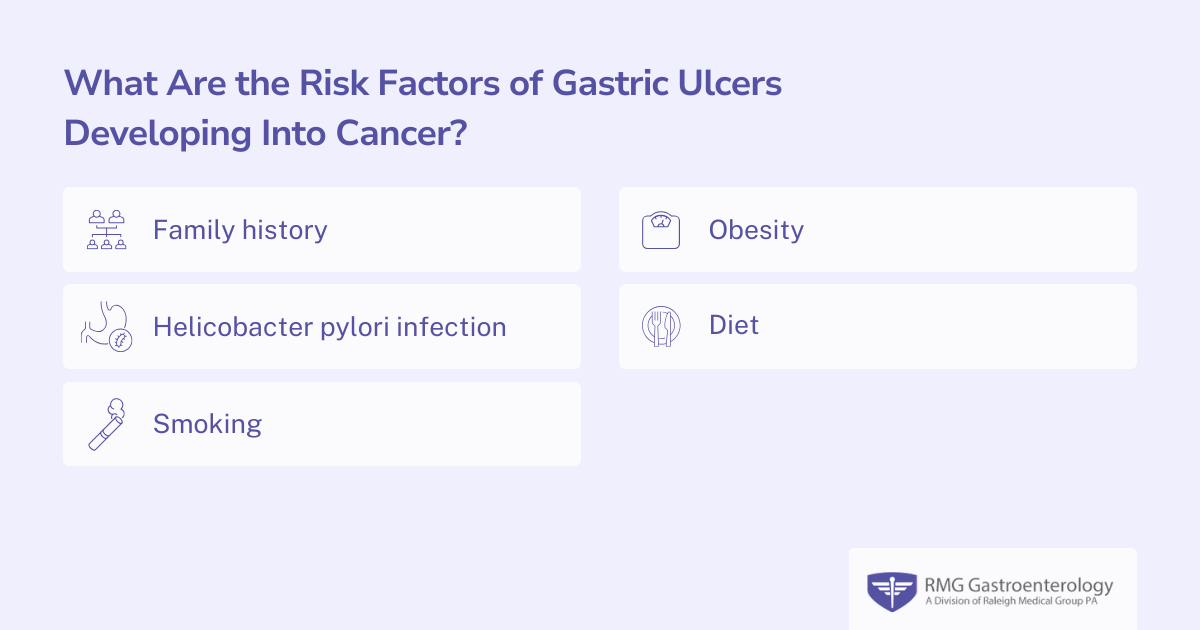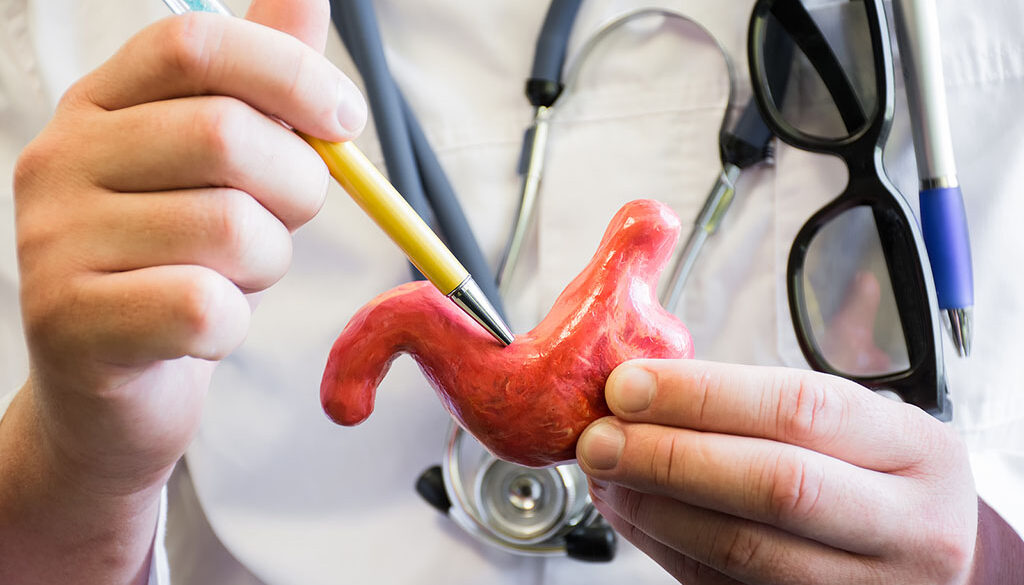Gastric Ulcers and Cancer: Is There a Connection?
You’re suspicious that this is more than a mere indigestion. The chronic abdominal pain, bloating and nausea have caused you to lose your appetite.
If you’re exhibiting any of these signs, we urge you to schedule an appointment with us as soon as possible because you may have a gastric ulcer. If so, getting prompt treatment is vital because there is a connection between gastric ulcers and cancer.
Over the decades, we’ve assisted thousands of patients, many of whom have endured the pain and discomfort of stomach ulcers. With the right treatment, you can reclaim your life from the distress of abdominal issues. We invite you to schedule an appointment with us so we can address your concerns and offer safe, effective solutions.
In this article, we’ll take a close look at the connections between gastric ulcers and cancer, as well as provide information on how our gastroenterologists in Raleigh can help you.
The Connection Between Gastric Ulcers and Cancer
If your ulcer goes untreated, it places you at a much higher risk for developing stomach cancer, especially if H. pylori is involved. H. pylori is a bacteria that can cause ulcers, and it’s also a major factor in the development of stomach cancer.
Do Gastric Ulcers Turn Into Cancer?
We’ve had many of our patients worried about the possibility: Can gastric ulcers cause cancer?
Remember, a gastric ulcer develops on the lining of the stomach, allowing your stomach acid to eat away at the lining. This inflammation can actually change the gastric lining, increasing your risk of stomach cancer.
Although not every ulcer leads to cancer, delaying treatment increases the risk of developing stomach cancer over time.
According to the American Cancer Society, there were an estimated 26,500 new cases of stomach cancer in 2023.
What Types of Cancers Can Be Caused By Gastric Ulcers?
Stomach cancer is the primary type of cancer that is caused by gastric ulcers.
However, if ulcers cause additional issues such as chronic acid reflux (GERD) then it can increase your risk of developing esophageal cancer.
What Risk Factors Can Cause Gastric Ulcers to Develop Into Cancer?
We encourage you to take a closer look at your risk factors for developing a gastric ulcer, and the connection between gastric ulcers and cancer. The primary risk factor is failure to get timely treatment for ulcers. Do not try to “tough it out” or delay getting help. We can offer solutions that will resolve the problem as soon as medically possible. Remember: The longer your ulcer goes untreated, the more extensive the damage to your stomach lining will be.
Other risk factors involving gastric ulcers and cancer include:

- Family history: Has someone in your family been diagnosed with stomach cancer? If so, this could increase your risk.
- Helicobacter pylori (H. pylori) infection: We mentioned this bacteria earlier, and it plays a pivotal role in the development of stomach cancer. While not everyone infected will develop stomach cancer, it is a high-risk factor.
- Smoking: Did you know that smoking doubles your risk of getting stomach cancer? We know it can be difficult to stop smoking, so we encourage you to take advantage of the helpful material from the Centers for Disease Control.
- Obesity: If you’re overweight or obese, you’re at greater risk of developing stomach lining inflammation, which over time can lead to cancer.
- Diet: We know you’ve heard repeatedly how important a healthy diet is for avoiding cancer, and the same principle applies for stomach cancer. Speak with us about some foods you’ll want to avoid when dealing with the discomfort and pain of an ulcer.
How We Treat Your Stomach Ulcer
When you schedule an appointment with us, we’ll outline a treatment plan and address all your concerns. This may involve having an endoscopy. During this procedure, we gently guide a thin, flexible tube equipped with a camera down your throat. While you will be awake during the procedure, you will be sedated, and local anesthesia may be used to numb your throat. This procedure is necessary so we can gather detailed information that enables us to create a plan specifically tailored for you.
Our Wake Endoscopy Center is a North Carolina State-certified ambulatory surgery center and is 1 of 15 endoscopy facilities in NC that are approved by the Accreditation Association for Ambulatory Health Care (AAAHC).
Our treatment plan may include medication or, if this is not successful, we may need to perform a minor procedure by cauterizing or placing medication directly into the wound.
Comprehensive Care That Places Your Needs First: See Why RMG Gastroenterology Is The Provider of Choice
For more than 50 years, we have focused on improving the health of the community, whether that involves colonoscopies to screen for colon cancer, treating ulcers, or providing services through one of our four Centers of Excellence.
If you suspect you have an ulcer, don’t delay in getting treatment. We encourage you to schedule an appointment today.
The content within this article and others on this website is only for educational purposes and should not be considered medical advice. For any questions or concerns, please consult with your healthcare provider.


